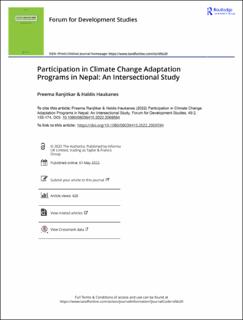Participation in climate change adaptation programs in Nepal: an intersectional study
Journal article, Peer reviewed
Published version

Åpne
Permanent lenke
https://hdl.handle.net/11250/3010305Utgivelsesdato
2022Metadata
Vis full innførselSamlinger
Sammendrag
In the social discourses of climate change, women are perceived both as vulnerable victims and as active players in adaptation. These perceptions of women along with inclusion policies have led climate change adaptation programs to seek women’s participation. However, ‘women’ is not a homogenous category. Intra-gender power differences in terms of castes and ethnicities can play an important role, especially in Nepal with its long history of institutionalized disparities. Using qualitative methodology, this study explores the relationships between gender, caste and ethnicity in shaping women’s participation in climate change adaptation programs in the southern plains of Nepal. We conclude that women’s gender identities generally facilitated their participation and that affirmative action for marginalized groups, to some extent, gave women from these groups spaces to participate in climate change adaptation programs. However, power relations associated with caste/ethnic identity created hindrances for marginalized women, implying that they had more restricted access than women from the majority groups.
